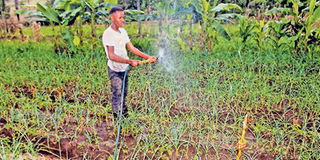Agronomist notebook: Avoid dirty water when irrigating farm

Francis Gachie waters garlic crops in a farm in Nakuru. Fish pond water should be used in irrigation for it contains high levels of ammonia, which is known to increase oxygen; a key nutrient for plant growth, in the soil. PHOTO | JOHN NJOROGE | NMG
What you need to know:
- There have been reports of Kenyans growing fruits, vegetables, edible roots and other crops along sewer lines. Such water is obviously dirty.
- A number of farmers also use untreated water on their lands, a situation blamed on the recent increase of lifestyle diseases among Kenyans.
- Factories and the real estate industry should treat their effluent and sewage before releasing it into rivers, lakes and other water bodies.
- To avoid the use of kitchen water on the farm, build a waste pit. And to prevent the draining chemicals in water sources, one should have a soak pit.
Due to global warming, many farmers in almost all parts of the country are gradually embracing irrigation. Irrigation is the artificial application of water to crops. It has increased the productivity of farmers.
Traditionally, farmers used to depend on rainfall as the only source of water for their crops.
Rainwater is less likely to contaminate agricultural food produce. Unfortunately, many parts of the country receive scarce rainfall. When the rain falls, it comes in torrents but for just a very short periods.
This calls for measures to be put in place by farmers if they are to properly utilise the various forms of the available water.
However, it should be borne in mind that artificial application of water to the land increases the risks of contaminating the food crops.
There have been reports of Kenyans growing fruits, vegetables, edible roots and other crops along sewer lines. Such water is obviously dirty.
Some also use kitchen waste to water their small gardens while others go to the extent of growing crops around abattoirs.
A few have built dams near rivers as others use pipes to divert river water. Doing this without the necessary permits could be illegal, though.
There are many sources of water. These include dams, rivers, harvested rain water, pans, boreholes and wells.
A number of farmers also use untreated water on their lands, a situation blamed for the recent increase of lifestyle diseases among Kenyans.
In some cases, farmers use the waste water to supply nutrients to their crops, thus reducing costs in terms of buying fertiliser. The consumer is the sufferer in this situation. On some occasions, the waste is the only water available.
Ignorance makes farmers use such water, not knowing that it could be carrying disease-causing micro-organisms.
Treated and contaminated water ends up in rivers - the main source of irrigation.
The water, usually green in colour, carries harmful micro-organisams which may also affect the growth of crops. Some of these plants end up rotting and dying altogether. Contaminated water kills fish and other animals found in rivers and lakes.
LESS HARMFUL TO CROPS
This is due to oxygen depletion, mainly if the waste water contains a high amount of phosphates that enhance the rapid increase and growth of algae. The algae are known for sucking oxygen from water.
If such animals cannot survive, it means the water is contaminated and is therefore not safe to humans as well. Farmers should therefore be careful when sourcing for irrigation water.
Factories and the real estate industry should treat their effluent and sewage before releasing it into rivers, lakes and other water bodies.
Kenyans may be going through rough economic times but that does not mean we grow crops near sewer lines.
Fruits, vegetables and other crops grown there absorb the dirty water and chemicals, passing them to the consumer.
Farmers are also advised to subject water to be used for irrigation to laboratory tests. If they can take their soil for analysis, why can’t they do the same to their water?
To avoid the use of kitchen water on the farm, build a waste pit. And to prevent the draining chemicals in water sources, one should have a soak pit.
This ensures that the chemicals are diluted, meaning they are less harmful to crops, animals and the environment in general.
Water from boreholes should be tested as it tends to have high salinity, blamed on clogging drip lines.
When salt accumulates in water, farmers should consider having a reverse osmosis to reduce the concentrations. The process, however, can be expensive.
The use of gypsum helps reduce the concentration of salts and improves soil water infiltration. Farmers should also mix fertiliser with black earth to control salt accumulation in the soil.
It is advisable to consider using nitric acid to lower the alkalinity of the water. Hydrogen peroxide or carbonates can be used to increase acidity.
Salt accumulation results in antagonism, where the availability of one nutrient prevents the uptake of others by plants.
Fish pond water should be used in irrigation for it contains high levels of ammonia. Ammonia is known to increase oxygen in the soil, a key nutrient for plant growth.





